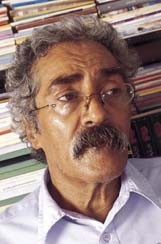Receive Our Newsletter
For news of readings, events and new titles.

The rain that had been falling since nightfall had now stopped, leaving small puddles by the pavements of the empty square. ‘Am Girgis [1] had taken the most recent telegram out of the pocket of his government jacket, which was tightly done up. He gave it to me, and accompanied me to the old building, which had been drenched by the rain. He stood in front of the wooden lift, indicating with a nod of his head a distant door, then walked off, leaving me there.
I was ‘Am Girgis who had undertaken to teach me the names of all the streets of the city, as it lay shrouded in the darkness of night-time, so that I could take his place when he in turn took over as head of the night shift, replacing ‘Am Bayyumi, who would be retiring in the New Year.
It was the first time that he had let me deliver a telegram on my own. I rang the faded yellow doorbell, and stood waiting until a light cam on inside. The shutter of the door, behind the iron grille, opened and out peered the face of an old woman, with a faint moustache and large eyes. She stood there just staring at my face for a few moments, then reached for the telegram and pen through the iron bars and retreated inside. When she came back with the receipt of delivery, I turned around and saw the door of the wood lift was closed, its thin panes of glass gleaming, so I hurried down the few stairs that there were, and out onto the small square. ‘Am Girgis was standing in he light of a solitary lamp, which hung high above, his hands in his coat pockets.
– “So?” he said.
– “Nothing.”
– “Did you deliver it?”
– “Yes.”
I walked towards him, holding out the receipt, and noticed her faint signature at the bottom of the paper. He stepped off the pavement, and we started walking along the street towards the building of the Authority; part of the iron railings that surrounded the large building was visible to us. HE raised his head, looking up at the sky.
– “It is going to rain.”
– “Mmmmm.”
– “She is an old woman,” he said.
– “Very,” I said.
– “The oldest woman in the whole area we deliver to.”
– “Really?”
– “Of course.”
We were approaching the large gate, which was standing open.
– “Does she live alone?” I asked.
– “Completely alone.”
He started cleaning the fronts of his shoes on the edge of the pavement.
– “She could’ve died.”
I smiled, and we walked through the gate; the security guard was asleep.
–It’s true; she could’ve died,” he said.
– “Anyone could die.”
– “Of course.”
He stopped.
– “But this is different.”
– “How?”
– “I mean, she could have a son that is ill, or is abroad, or a daughter who is having an operation or having a baby, anything. You say ‘telegram’, she drops down dead.”
– “To that extent?”
– “Of course.”
He put his hand into his coat pocket, took out a packet of cigarettes, and opened it.
– “It’s happened to me twice,” he said, giving me a cigarette.
“I say ‘telegram’, and the woman dies.”
– “Without even reading it?”
– “Without anything.”
– “How strange.”
– “Not at all.”
We walked under the dense trees, heavy with soaked leaves, in between the two large buildings, stopping at the top of the street which sloped down towards the open car park.
– “It is not a bad percentage in thirty years of delivering post.”
He took out a box of matches.
– “ ‘Am Bayyumi has had seven die on him. And then there was the postman Qadri, ‘the Englishman’, who had nine die on him.” His hand trembled as he held the match.
– “The thing is, people in the past used to have really weak hearts.”
He lit another match.
– “Two is a reasonable number.”
We started walking down the sloping road; I pictured the old woman peering out at me with her big eyes through the iron bars. We crossed the open court yard and stopped in front of the half-closed side entrance.
– :I don’t mean to frighten you.”
Then, from a distance I heard him say:
– “I just had to tell you.”
I stood there on my own for a while, then I looked up at the clouds, which were turning red around the edges in the night of the city. A drop of warm rain fell on my left cheek; as I wiped it dry, I glimpsed ‘Am Girgis, with his large nose and beautiful eyes, watching me silently.
[1]‘Am is a word of endearment and respect used of an older person; literally, it means ‘uncle’.
Translated by Maya Abu-Deeb
* This novel extract is section 2 of Ibrahim Aslan’s Wardiyyat Layl [Night Shift], which is written as a novel but divided into small sections each almost readable independently from the others, but forming part of a total work one and the same time. The first volume of this work was published in 1991 by Dar Sharqiyyat, Cairo.